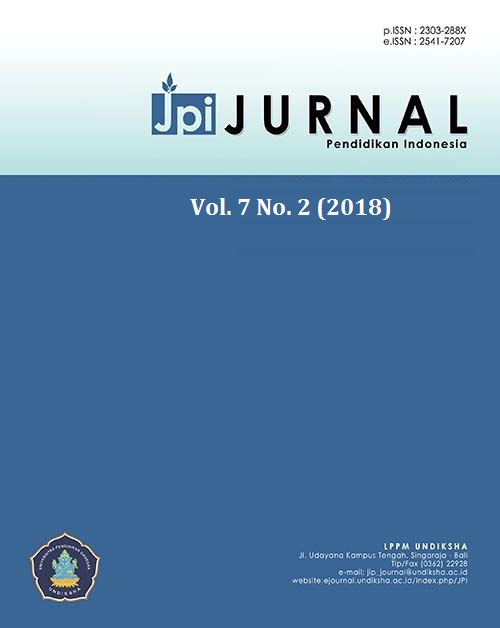Development of Chemistry Module for Junior High School Based on Inquiry Accompanied by Performance-Based Assessment
DOI:
https://doi.org/10.23887/jpi-undiksha.v7i2.10617Keywords:
Module, Inquiry, Performance-Based AssessmentAbstract
The learning process in the chemistry for junior high school course emphasizes the concept discovery process, so inquiry learning is one alternative solution that can be done. The purpose of this study is to develop inquiry-based chemistry for junior high school course modules along with performance assessment. This research includes development research (Research and Development) which is generally divided into three stages, namely draft development, validation, and readability test. In the development phase of the draft module, a questionnaire, observation, and documentation technique were selected, in addition to the literature review (theory and previous research). The validation stage used validation sheets and interviews. In the readability, the phase uses the module readability questionnaire. The results showed that the developed and valid SMP chemistry modules were used from the aspects of objectives to be achieved, writing approach, truth, and depth of concepts, language clarity, the suitability of inquiry models with learning stages, physical appearance and appropriateness of performance appraisal with the learning process if the module was applied. The readability test results show that students give positive responses to the module in terms of their interest in content and appearance, renewability of content, interest in solving problems, ease of understanding the content and direction of completion.
References
Achmaliya, N., Rosilawati. I., dan Kadaritna, N. 2016. Pengembangan Modul Berbasis Representasi Kimia Pada Materi Teori Tumbukan. Jurnal. Pendidikan dan pembelajaran Kimia. 5(1): 114-127
Arends. 2012. Learning to Teach, Ninth Edition. New York: McGraw-Hill.
Astuti DE dan Nugroho WS. 2017. Kemampuan Reagen Curcumax Mendeteksi Boraks dalam Bakso yang Direbus. Jurnal Sain Venteriner, Volume 35 (1): 42 – 48.
Bailin. 2002. Critical Thinking and Science Education. Journal Science & Education, Volume 11 (2): 361–375.
Brahim, T. K. 2007. Peningkatan Hasil Belajar Sains Siswa Kelas IV Sekolah Dasar Melalui Pendekatan Pemanfaatan Sumber Daya Alam Hayati di Lingkungan Sekitar. Jurnal Pendidikan Penabur, Volume 6, Nomor 9, Halaman 47-49.
Bretz, L. 2008. Chemistry in the National Science Education Standards 2nd Edition. New York: National Academic Press.
Fauziah, R, Abdullah, A. G. dan Hakim, D. L. 2013. Pembelajaran Saintifik Elektronika Dasar Berorientasi Pembelajaran Berbasis Masalah. Jurnal Innovation of Vocational Technology Education, 9(2): 165-178.
Flik dan Lederman. 2006. Scientific Inquiry and Nature of Science: Implication for Teaching, Learning and Teacher Education. Netherlands: Spinger.
Holbrook. 2005. Making Chemistry Teaching Relevant. Journal Chemical Education International, Volume 6 (1): 11 – 18.
Jazadi. 2005. Evaluasi dan Pengembangan Proses Belajar-Mengajar di Perguruan Tinggi. Jurnal Ilmu Pendidikan, Volume 12 (1): 1 – 17.
Kemp. 2010. Designing Effective Instruction (6th Edition). New York: Macmillan College Publishing Company.
Lasmiyati dan Harta I. Pengembangan Modul Pembelajaran Untuk Meningkatkan Pemahaman Konsep dan Minat SMP. Jurnal Pendidikan Matematika: Pythagoras, Volume 9 (2): 161 – 174.
National Research Council. 2000. Inquiry And The National Science Education Standards: A Guide for Teaching and Learning. New York: National Academic Press.
Novratilova, D., Kadaritna, N., dan Tania, L. 2015. Efektifitas Problem Solving dalam Meningkatkan Keterampilan Mengelompokkan dan Menyimpulkan pada Asam Basa. Jurnal Pendidikan dan Pembelajaran Kimia, 4 (1): 782-794.
Raabany. 2014. “The Acquisition Of Science Procees Skills by Omant’s Pre-Service Social Studies’ Teachers”. European Journal of Educational Studies, Volume 6 (1): 13 – 19.
Rasmawan, R. 2015. Deskripsi Keterampilan Berpikir Kritis, Berpikir Ilmiah, dan Metakognitif Mahasiswa Pendidikan Kimia FKIP Untan. Laporan Penelitian DIPA Fakultas FKIP Untan. Tidak dipublikasikan.
Sugiono. 2011. Metode Penelitian Kuantitatif, Kualitatif dan R & D. Bandung: CV Alfabeta.
Supahar. 2015. Pengembangan Instrumen Penilian Kinerja Penyusun Laporan Praktikum Fisika SMP Berbasis Inkuiri. Jurnal Pendidikan Matematika dan Sains. Volume 3, Nomor 1.
Suyanti, R.D. 2010. Strategi Pembelajaran Kimia. Yogyakarta: Graha Ilmu.
Ulya, Haritsah. 2018. Pengembangan Modul Kimia Berbasis Problem Solving Pada Materi Asam Basa Arrhenius. Jurnal Pendidikan dan Pembelajaran Kimia, Vol 7, No 1.
Yadav dan Mishra. 2013. “A Study of the Impact of Laboratory Approach on Achievement and Process Skills in Science among Is Standard Students”. International Journal of Scientific and Research Publications, Volume 3 (1): 1 – 6.
Downloads
Published
Issue
Section
License
Authors who publish with the Jurnal Pendidikan Indnesia agree to the following terms:
- Authors retain copyright and grant the journal the right of first publication with the work simultaneously licensed under a Creative Commons Attribution License (CC BY-SA 4.0) that allows others to share the work with an acknowledgment of the work's authorship and initial publication in this journal.
- Authors are able to enter into separate, additional contractual arrangements for the non-exclusive distribution of the journal's published version of the work (e.g., post it to an institutional repository or publish it in a book), with an acknowledgment of its initial publication in this journal.
- Authors are permitted and encouraged to post their work online (e.g., in institutional repositories or on their website) prior to and during the submission process, as it can lead to productive exchanges, as well as earlier and greater citation of published work. (See The Effect of Open Access)








